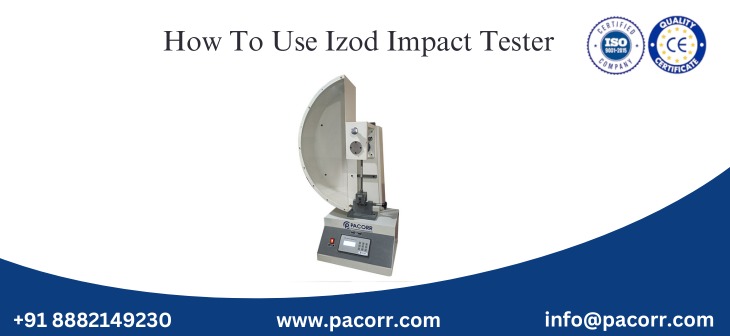
Pacorr is a trusted name in the testing equipment industry, offering highly advanced and precision-built instruments designed to meet the dynamic demands of quality assurance. One such essential instrument in material testing is the Izod Impact Tester. Known for its ability to evaluate the impact resistance of plastics, metals, and composites, the Izod Impact Tester plays a vital role in determining how a material behaves when subjected to sudden force or shock. This guide explains how to use the Izod Impact Tester effectively and why choosing a reliable Izod impact tester manufacturer like Pacorr ensures optimal performance and accuracy.
What is an Izod Impact Tester?
An Izod Impact Tester is a standardized testing machine used to assess the impact resistance or toughness of materials. This test is conducted by swinging a pendulum to break a notched sample specimen and measuring the energy absorbed in the process. The results help manufacturers understand the durability and strength of materials used in automotive, packaging, consumer goods, and construction applications.
Why the Izod Impact Test is Important
Material performance is crucial in product design and development. If a material cannot withstand sudden force, it may lead to catastrophic failure during actual use. Here are some reasons the Izod Impact Test is important:
- It helps identify brittle or ductile behavior in materials.
- It is vital for comparing different materials for product suitability.
- It enhances product safety and reliability.
- It ensures compliance with industry standards.
Manufacturers rely on Izod Impact Tester results to make data-driven decisions regarding material selection, design improvements, and quality control.
Components of Pacorr’s Izod Impact Tester
Before learning how to use the machine, it's important to understand the key components that make up Pacorr's high-performance Izod Impact Tester:
- Pendulum Hammer: Delivers a consistent impact force.
- Specimen Holder: Firmly holds the test sample in a vertical position.
- Notching Apparatus: Prepares the sample with a notch to guide the fracture.
- Energy Scale Indicator: Displays the absorbed energy after impact.
- Control Panel: Allows easy setup and operation of the test.
These components work in unison to provide accurate and repeatable results, making Pacorr a leading Izod impact tester manufacturer in the market.
How to Use an Izod Impact Tester: Step-by-Step Instructions
Follow these steps to perform an Izod impact test accurately:
1. Sample Preparation
Begin by preparing the test specimen according to the required standards such as ASTM D256 or ISO 180. The sample should be rectangular, typically measuring 63.5 mm x 12.7 mm x 3.2 mm with a V-shaped notch at the center. The notch acts as a stress concentrator and must be cut precisely using a standard notching machine.
2. Machine Setup
Ensure the Izod Impact Tester is clean and properly calibrated. Secure the pendulum hammer at its starting position using the locking mechanism. Adjust the energy scale to zero.
Check the type of pendulum being used. Different materials require different energy capacities. Always use the appropriate pendulum for the material type and thickness.
3. Insert the Specimen
Place the prepared specimen vertically in the specimen holder, ensuring that the notched side faces the pendulum and the notch is aligned with the point of impact. Tighten the holder clamps to prevent any movement during testing.
4. Release the Pendulum
Once everything is set and aligned, release the pendulum. It swings down and strikes the specimen at the notch, causing it to break. The energy absorbed by the specimen during the fracture is automatically displayed on the scale.
5. Record the Results
Note the energy value shown on the energy scale. This value indicates how much energy the specimen absorbed before breaking. This is usually measured in Joules (J) or Foot-Pounds (ft-lb), depending on the standard being followed.
6. Repeat for Accuracy
To ensure consistency and eliminate anomalies, repeat the test on multiple samples of the same material. Take the average of the recorded values for a more reliable analysis.
Best Practices for Accurate Results
To get the most accurate and consistent readings from your Izod Impact Tester, follow these best practices:
- Always use properly notched and standardized specimens.
- Regularly calibrate the instrument according to manufacturer guidelines.
- Avoid using worn-out pendulum hammers.
- Ensure the machine is on a vibration-free surface.
- Maintain a stable room temperature during testing, as materials may react differently under varying temperatures.
These tips ensure your results are not only accurate but also repeatable, which is essential in any quality assurance process.
Applications of Izod Impact Testing
Izod impact testing is used across several industries:
- Plastic manufacturing: To test the toughness of polymers for packaging and automotive parts.
- Metal industries: To ensure metals meet required impact resistance for structural applications.
- Consumer goods: To evaluate product durability under rough handling.
- Research and development: To compare material strength under dynamic loading.
No matter the application, choosing the right Izod Impact Tester manufacturer is key to ensuring long-term performance and reliability.
Factors That Influence the Izod Impact Test
Understanding what influences test outcomes helps in making informed decisions:
1. Temperature of the specimen: Cold materials tend to be brittle, while warm ones are more ductile.
2. Material orientation: Grain direction can affect how the material breaks.
3. Notch quality: Imperfect notches lead to inconsistent results.
4. Specimen thickness: Thicker samples may absorb more energy.
Knowing these variables can help operators interpret results more accurately.
How to Choose the Right Izod Impact Tester Manufacturer
With several options available, selecting the right Izod Impact Tester manufacturer is critical. Here’s what to look for:
- Experience: A manufacturer with years of experience understands your industry needs.
- Product Quality: High-grade materials and precision engineering ensure durability and accuracy.
- Calibration Services: Periodic calibration guarantees consistent results.
- After-Sales Support: Timely customer service ensures smooth operations.
- Competitive Izod Impact Tester Price: Value-for-money pricing without compromising on performance.
Pacorr excels in all these aspects, offering industry-standard machines with modern features and reliable service.
Understanding Izod Impact Tester Price
The Izod impact tester price depends on several factors:
- Type of pendulum (manual or motorized)
- Energy capacity (Joule or foot-pound range)
- Compliance with standards (ASTM, ISO)
- Automation features and data logging
- Brand reputation and support services
While low-cost options may seem attractive, they often lack precision and long-term durability. Investing in a high-quality tester from a trusted manufacturer like Pacorr ensures better returns and peace of mind.
Conclusion
Pacorr’s Izod Impact Tester is a powerful and essential instrument in modern quality control laboratories. Whether you're testing plastics, composites, or metals, it enables you to measure the toughness of materials with high precision. This step-by-step guide shows that using the Izod Impact Tester involves more than just releasing a pendulum; it requires attention to sample preparation, alignment, and interpretation of results.
Choosing a reliable Izod Impact Tester manufacturer ensures that your testing is compliant with international standards, and provides dependable results. While evaluating the Izod impact tester price, focus on value, accuracy, and support rather than just initial cost.
For consistent and high-performance testing, trust a brand that delivers excellence — trust Pacorr.
Thanks to Pacorr Testing instruments, we have all the required quality testing instruments that have helped us to ensure the best quality delivered to our clients.

Danish
Fair Exports Pvt. Ltd.
Copyright © 2024. All rights reserved.

